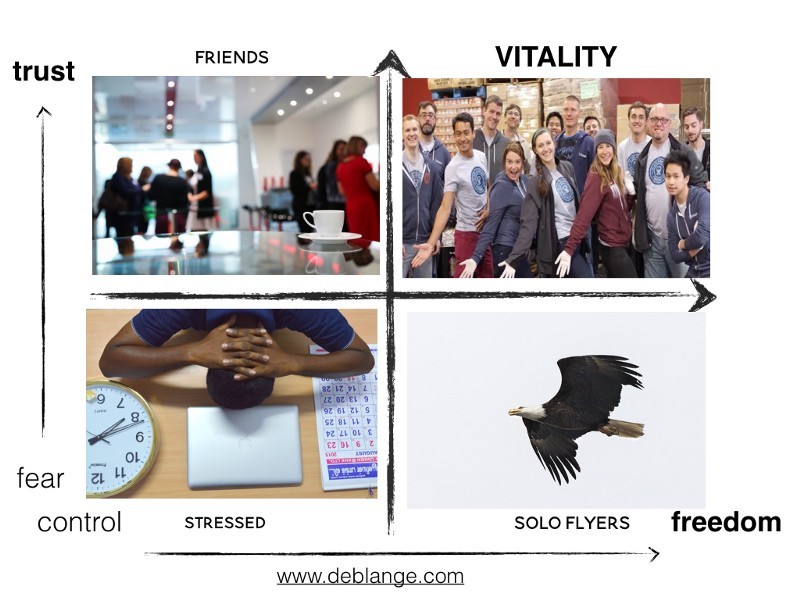I was Coaching “Vera”, a Senior Project Manager, (name changed) who had a problem with her “boss”. He was the kind of person who micro-manages, controls, is incredibly demanding, you can never please and you sense there is no empathy for the good work you are doing.
Now some people are not “triggered” by this kind of person. They have ways to work around them, still do good work and don’t get upset. But for Vera and many others, this kind of controlling behaviour triggers emotional upset, stress and anxiety. She was not thriving. She was worked incredibly long hours to please him. She was not sleeping well. She was anxious. She had one foot in the door and the other foot out, looking for another job.
She would get emotionally upset when he told her yet again that what she was doing was not good enough, or he wanted her to do something different, even though she would let him know the success of her approach from her clients. She was literally beside herself with frustration and was not sleeping. Other team members had left due to his behavior. She wasn’t the only one who could not cope with being controlled.
“What the ….???? can I do”, she said.
I asked her if there was anyone else in her life who reminded her of this behavior. She thought for awhile.
She said, “He reminds me of my Dad. I could never please him. I always had to do what he wanted. I had to work really hard to get his approval etc etc.”
“Hmm,” I said, “interesting”. I asked, “Does everyone trigger you like this? Is this normal behavior?”
She said, “NO when I work for “Joanne”, we are partners. I can share my fears, excitement and challenges. I am accepted and I accept her. We work together, have great fun and achieve lots.”
I said, “Ok well let’s equip you with a new set of capacities when triggered by being controlled or micromanaged.”
7 Capacities:
1 Breathing — She learnt how to keep breathing when she felt triggered. As soon as we are tense and shallow breathe chemicals in our body are being released that amplify a state of fear. Being able to expel air and breathe in deep helps maintain a sense of calm and neutrality.
2 Physical Space — She learnt where to place herself in the physical space when working with him. She either stood alongside him, or sat at 90 or 180 degree angles at a desk. Se never sat or stood directly opposite. His energy was not directed at her, and hers was not directed at him in the physical space.
3 Temperature — She became aware that when she started to feel her temperature rise, and perspiration beads were on her forehead it was an early warning signal that she was being triggered into a state of defensiveness. When that happened now she changed her physical state; she got up, moved, and breathed. Even the slightest movement would help her come back to neutral.
4 Movement — She learnt how to exform toxic, frustrated, angry energy safely. If she felt frustrated or angry after an interaction she would walk away, sometimes walk outside or to the toilet, where she would literally shake her arms and her legs and shake out the “bad” energy from her body. Breathing and returning to a neutral state so she could get on with her work.
5 Voice tone — She learnt to discern different voice tones. one voice tone could have authority, but she would not be triggered, another voice tone was overpowering and controlling and she would sense her defensiveness rise. She listened to her own voice tone. When her voice went high like a little girl she knew she was triggered. She would take a breathe and start to talk from deep within her belly. Centering herself and pausing between what she was saying to maintain her strength.
6 Visual — She learnt to see how a person changed their body and their facial expressions when they were either being controlling or when they were being approachable. These acted as early warning signals for her to sense being composed and not react to the controlling energy of somebody else.
7 Mirroring energy — she learnt to see when mirroring someone’s behaviour is delightful as their energy and sense of being is thriving. When being playful she could also be playful, or when being quiet she could also be quiet. She learnt how not to match some one when the energy of another person was not helping them thrive and she did not want to mirror an energy state of anxiety.
The Outcome
These are just 7 capacities Vera learnt to become strong, grounded and thrive. He backed off. She stayed in the organisation. He ended up giving her a glowing report which resulted in a promotion. She finally felt he “got” her, “accepted” her and appreciated her approach.
She never had to confront him. She did not have to go it alone and become a “solo flyer” and leave the organisation, nor did she have to “make friends”, “suck” up to him and be a slave to him.

She did confront her own reactions and learnt to respond in the moment in ways that helped her thrive rather than being disabled. She learnt new strategies, and in the end rather than experiencing him as the enemy, he turned into a professional partner who was walking alongside her, supporting her. Yes, he still did occasionally press her buttons, but she had strategies to sense her well being and thrive.
She developed empathy with him. She realized there must be something in his life of which he was unaware that he needed to be so controlling of others.
Unexpected consequences
As she gained the capacity to not be triggered by being over controlled, she began to be different in her father’s company. She transformed her relationship with her father at the same time, and instead of maintaining a child-parent relationship with him, experienced talking adult to adult with her father.
Sleeping soundly, and waking excited about going to work again.
My book “Trust Your Senses — Embodied Wisdom for the Modern Age” has many more strategies to learn how to thrive from our embodied intelligence.
Originally published at medium.com


